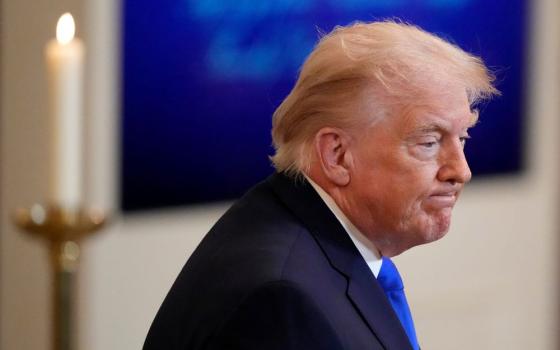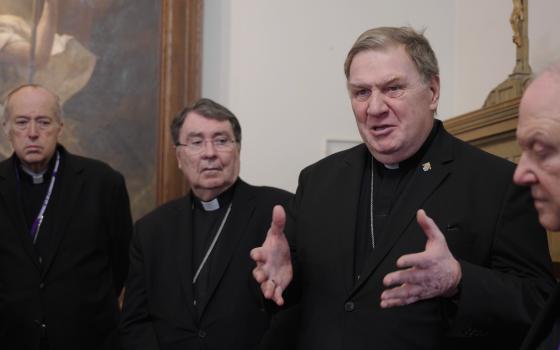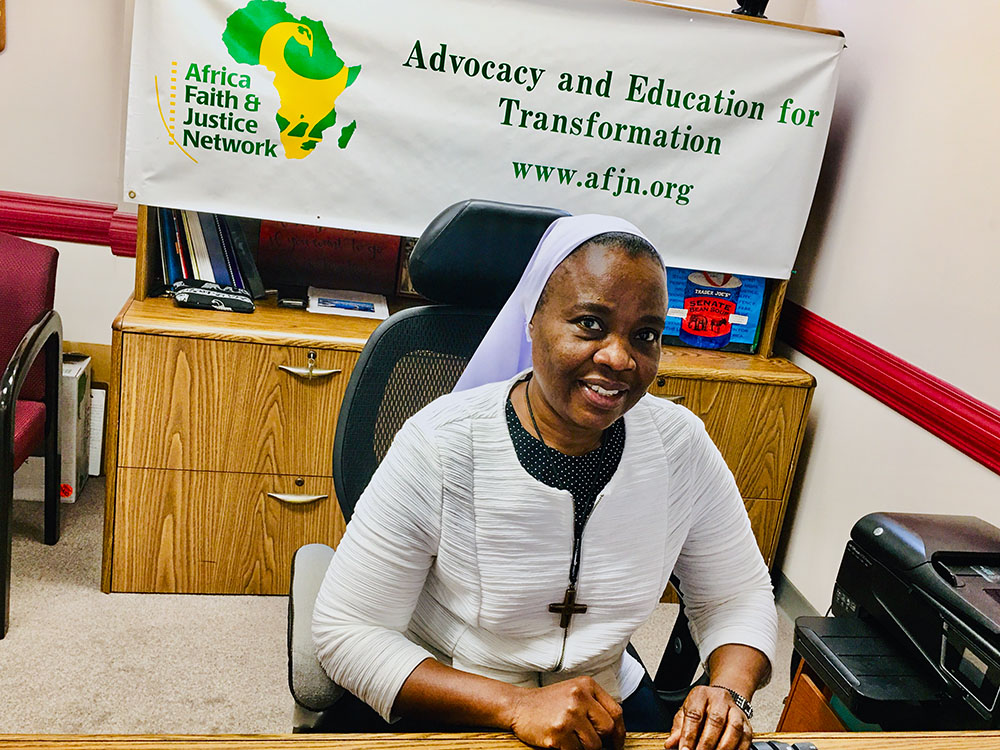
Notre Dame de Namur Sr. Eucharia Madueke poses in her office in Washington, D.C. Madueke is the coordinator of the Africa Faith and Justice Network's Women Empowerment Project. In her role, she works with sisters across Nigeria, training and mobilizing them to raise awareness about gender-based violence, human trafficking and harmful cultural practices. (Courtesy of Eucharia Madueke)
Notre Dame de Namur Sr. Eucharia Madueke serves with quiet purpose and determination as the coordinator of the Africa Faith and Justice Network's Women Empowerment Project. In her role, she works with sisters across Nigeria, training and mobilizing them to raise awareness about gender-based violence, human trafficking and harmful cultural practices.
A lifelong learner and graduate of Howard University, Madueke earned her doctorate in public and development policy, but believes real social change begins with educating the public, enlightening stakeholders and shifting mindsets.
She was born into a household where her father converted to Catholicism as an adult, and when she was a teenager, she taught him catechism in preparation for his confirmation. That early role planted the seed of leadership within her. However, she fully understood resistance much later.
"I was admitted into the University of Nigeria, Nsukka, where I had an encounter that would shape the way I react to oppression and injustice," she said.
She told Global Sisters Report that one of her lecturers attempted to embarrass her in class by posing difficult questions after she had refused his advances. One day, he accused her of making noise in class and called her a liar when she denied it. He spoke harshly, causing her to tear up. He later demanded an apology letter, which she refused to write. Everyone, including fellow sisters, urged her to comply, but she felt strongly that injustice needed to be resisted. Her commitment to resistance came from this experience and learning to say no, even when it is easier to say yes.
In this interview with Global Sisters Report, Madueke discusses her background, projects and future work.
GSR: What were your formative years like?
Madueke: I am my parents' first daughter. My mother always insisted that peace must reign, while my father believed that the right thing must be done. I believe I inherited both traits: the compassion to care and the courage to confront. Other than this, I was just a normal girl.
Advertisement
When I decided to become a nun, my father didn't fully approve, but he didn't stand in my way either. My mother, on the other hand, told me I'd be welcomed home if I ever found convent life uncomfortable.
What drew me in was the simplicity of the sisters I met. No one asked for recommendation letters or made things difficult. Someone simply took me to the fridge, opened it and said, "Pick a drink." That single gesture made me feel at home.
Given Nigeria's long-standing economic challenges, many must focus on survival and meeting their daily needs. Why, in the midst of all this, have you chosen to fight gender-based violence?
This is like the chicken-and-egg situation. Some might argue that hunger or poverty should be the top priority. But if you're looking at it inversely, you'll realize that when people change, situations change. So, addressing gender-based violence isn't a distraction from economic issues — it's actually one of the root ways to solve them.
As the coordinator of the Women Empowerment Project, tell us about its organization and your role.
The Women Empowerment Project is a coalition of African women religious working at the local, regional and continental levels for social justice. Sisters are trained to challenge structures that keep people in poverty.
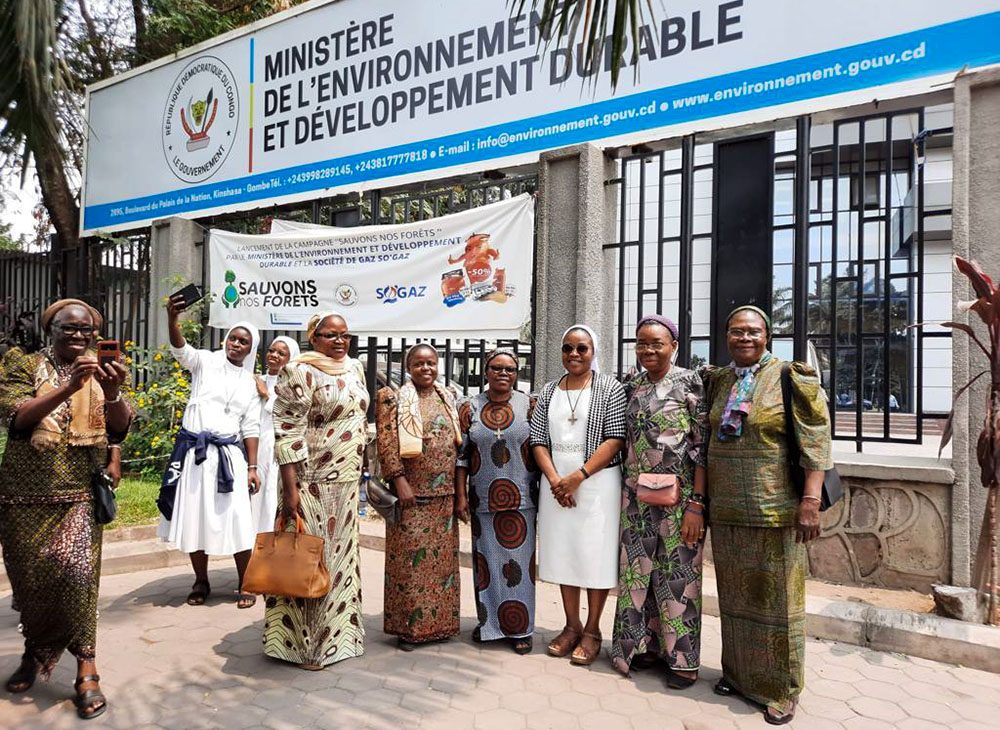
Notre Dame de Namur Sr. Eucharia Madueke (third from the right) and her team at the office of the Federal Ministry of Environment, during preparations for advocacy training for sisters in the Democratic Republic of Congo. (Courtesy of Eucharia Madueke)
[When it comes] to coordination, we leverage existing church structures. We work with area and national coordinators and established groups, including the Nigeria Conference of Women Religious, Catholic Women Organization, and international justice and peace committees. Whenever we have a project, we reach out through these networks.
You work at the intersection of faith, law and culture. What cultural beliefs hinder progress, and how are you confronting them?
The law is clear enough. However, culture seems to be the most challenging. For example, in Calabar, there's a practice where families repay loans by giving away their girls (for marriage) if they're incapable of repaying the debt. In such communities, we engage directly with elders and titleholders.
It's amazing how many of them become sober-minded when we explain the long-term damage of domestic servitude and the importance of protecting their girls. We make the chiefs sign MOUs (memoranda of understanding) committing to change. We also work with the National Agency for the Prohibition of Trafficking in Persons to back these efforts legally.
How do you navigate resistance from traditional male chauvinism, the deep-seated culture of impunity and political inadequacies?
We understand the cultural and political terrain — we know how to engage strategically by first identifying key stakeholders and respecting community cultural sensitivities while still advocating for reform. That makes it easier for us to persist, even when the resistance is strong.
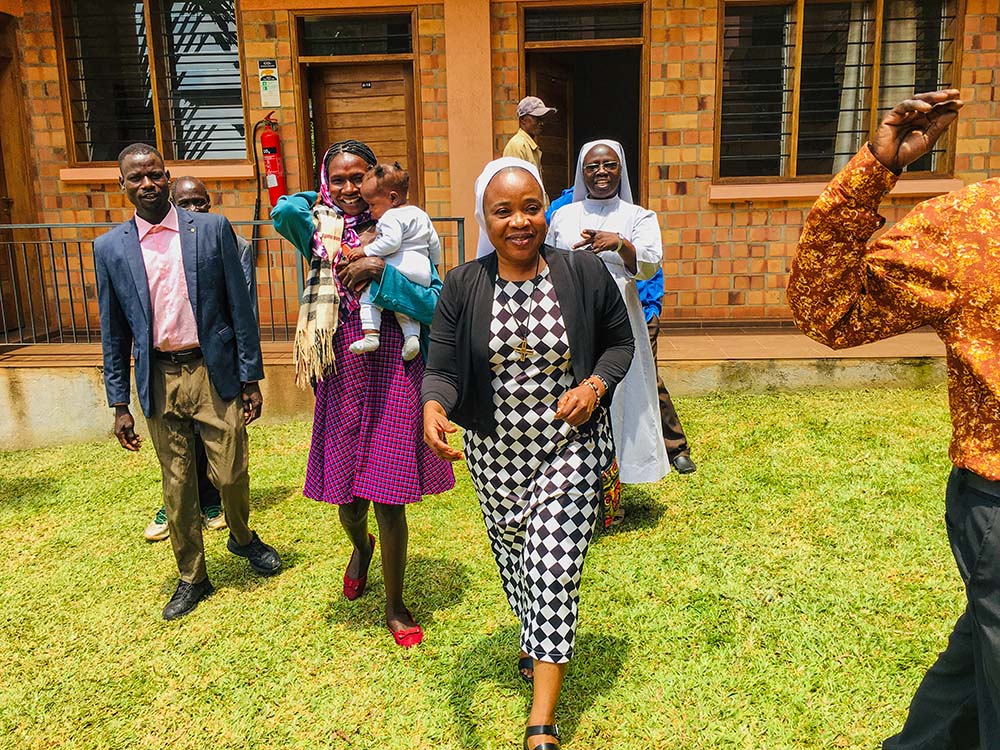
Notre Dame de Namur Sr. Eucharia Madueke after a meeting at the Pope John Paul II Justice and Peace Centre in Kampala, Uganda. (Courtesy of Eucharia Madueke)
Have you seen any policy changes or governmental collaborations that give you hope?
We don't emphasize policy much anymore. There are a bunch of beautiful laws that often sit in drawers without implementation. We focus on grassroots change.
In a village in Ogun State, for example, the traditional ruler, whose cabinet was entirely male, introduced what they called a "gender desk" after our engagement. He appointed three women to receive community reports and directly present them to him. All these are a spark of light.
Every story we encounter is worth telling because the ripple effect of a girl rescued cannot be quantified. I recall a young girl in Abakaliki who attended one of our community engagements carrying a baby. We were stunned to discover that the elderly man standing beside her was her husband.
Given the scale of gender-based violence in Nigeria, do you see faith-based activism gaining more traction nationally?
Yes. For two reasons: First, religion is huge in Nigeria. Second, faith-based organizations are closer to the people than the government. With coordination and passion, I'll say, yes.
The government must pay closer attention to women. When a woman is hurt, she's likely to raise unhappy children. That's a cost no country can afford. And for the church, we must not give up on helping and collaborating with the government.
Looking ahead, is there any program in the pipeline?
Coming in August, we have a national campaign, "Women and Children Trafficking, Early Marriage and Child Labor." We are also planning on adding an economic empowerment program to our advocacy in Nigeria next year.






